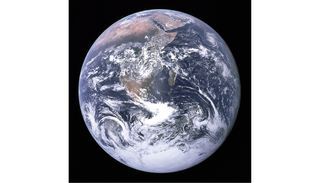The Planet, Our Body
Why is mankind - the thinking species - so unbalanced?
The ancient Greeks invented the concept of ‘hubris’ - the overweaning pride when mortals thought they were equal to the gods - and it’s more prevalent today than ever. In Greek mythology and the Greek tragedies, the merely mortal heroes always came off worse in the end.
In the twenty-first century we seem to think we can postpone indefinitely that day of reckoning. I don’t just mean the environment, though obviously that, but there’s:
over-population
increasing ineffectiveness of antibiotics
creeping protectionism of resources
growing parochialism and nationalism
… not to mention religious fundamentalism and terrorism
So how is it that mankind - the thinking species, capable of rational decision-making - is edging inexorably towards what could be the final day of reckoning? Arrogance, certainly, coming from having been able to come out on top of other species; and for the last few hundred years observing in more and more fields that he is able to surmount obstacles put in his way by physical realities and his environment.
But that only begs the question - “whence the arrogance?” Is it too facile to say that arrogance is learnt? Can it come purely from the observation that we can overcome (obstacles) better than the rest of the pack (of living things) and so we start to believe that we are the best, if not supreme? Or did it need a seed of belief that it would be possible to walk on two limbs, before it actually happened?
Perhaps we don’t need to answer the question about how, because neither answer would alter the challenge we face in changing our attitude to put us on a different course. Whether through an innate imperative to win or a learnt belief in supremacy, the shift in attitude that is needed is the same.
The opposite of hubris is humility. CS Lewis said that humility was not thinking less of yourself, but thinking of yourself less.
So... to think of ourselves less… to look on ourselves, in relation to others, differently? Martin Buber, author of the iconic work “I and Thou”, held that we think of ourselves in relation to others in two alternate and alternating ways: we either objectify others by seeing them only through the lens of our perception (and that covers almost all of our dealings with our fellow humans); or we let them be a presence alongside our presence, without making any judgement or needing to have an opinion about them, allowing them simply to be completely their own living being. The former he called a stance of “I-It”, the latter a stance of “I-Thou”.
In the context of our relationship with our living environment in all its aspects, the shift from I-It to I-Thou would be equivalent to thinking not in terms of Nature, but of nature. Discussions and thinking about the environment invariably incorporate a notion of Nature and, in giving it a capital ‘N’, make it separate from us, something which is a facility in our life, something which we use and need to manage. But in reality the natural world, bound up in the planet, contains us and so cannot be our object. Like a baby in the womb, contained by its mother, not knowing itself separate from her body which is its whole existence, we cannot know ourselves outside the realm of the planet, which we could call our body.
" The planet, our body " would be a rallying cry of a different kind; one which implicated humanity, with its over-consuming lifestyle, as the cancer which is the source of a life-threatening condition. For there are only two variables in the equation which describes our ongoing existence in a finite space, depending as it does on balancing increasing efficiency in the depletion of resources with our overall rate of consumption.
In reality it is probably already too late for the equation to be balanced:
a dramatic reduction in population growth will eventually produce a time when there are insufficient productive members of society to support its dependents
the continued over-use of antibiotics points to infection which cannot be controlled, or a medium-term unacceptable rise in suffering and deaths
increasing protectionism of vital resources will lead to nationalism on one side and, on the other, simmering unrest and unstoppable migration
growing parochialism will stunt co-operative development as the only possible route to salvation
… and fundamentalism of any creed is the starting point for fanaticism, and the enemy of change.
If there were still time, salvation could only come from an understanding of the process of our most basic relationship, that of ourselves with the cradle of our being, the planet; a shift from seeing the planet as our object to seeing it as our 'Thou'...
The Planet, Our Body.






 Related Stories2015 needs to be the Year of HumilityFacebook eat your heart out!Yin, Yang
Related Stories2015 needs to be the Year of HumilityFacebook eat your heart out!Yin, Yang




